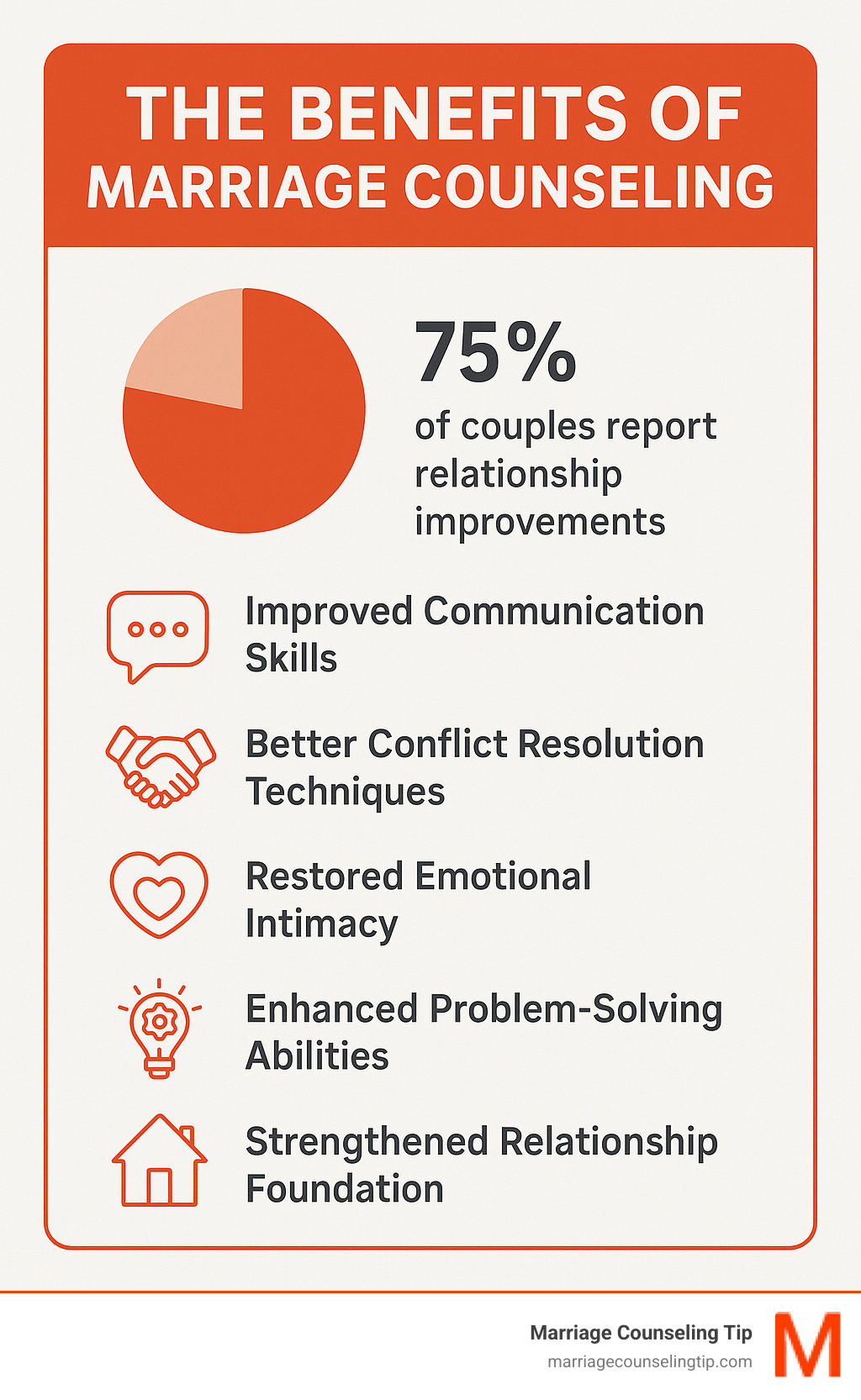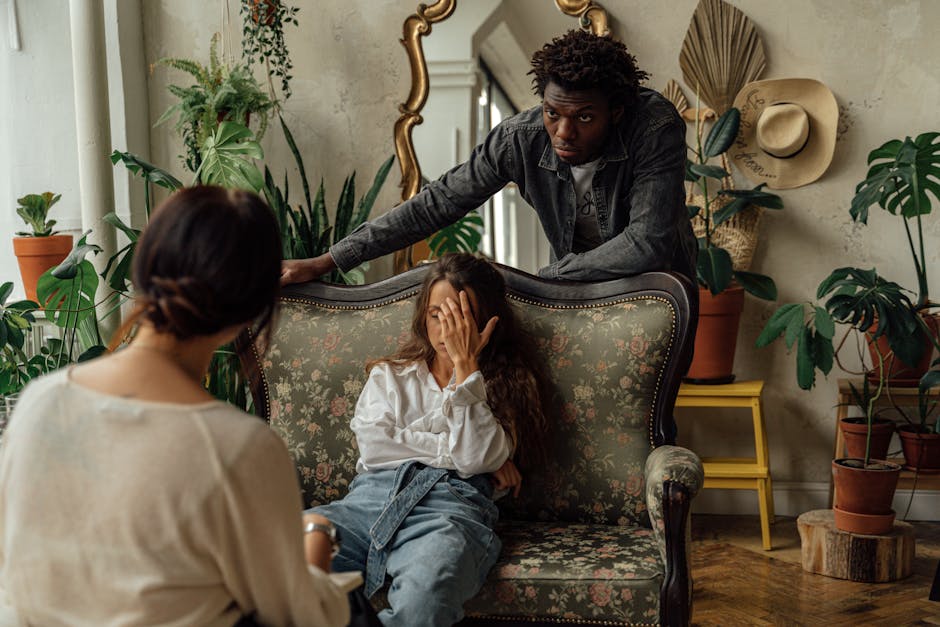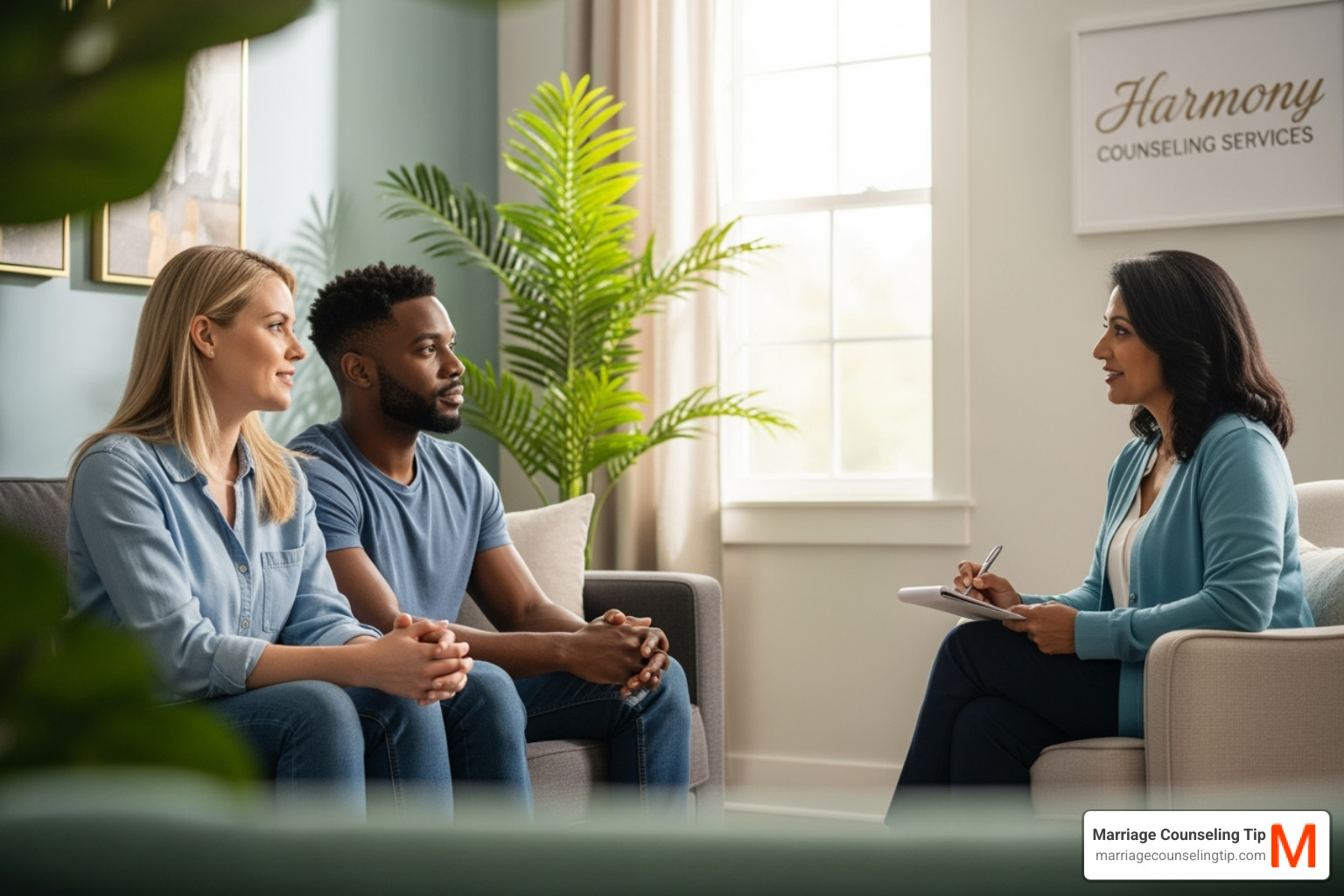
Why Finding the Right Marriage Counselor Matters for Your Relationship
If you’re looking for marriage counseling near me, you’re taking a brave first step toward healing your relationship. Help is available, and research shows that 75% of couples who attend marriage counseling report improvement.
Quick Answer for Finding Marriage Counseling Near You:
- Ask for referrals from your doctor, friends, or individual therapist.
- Search online directories like Psychology Today or professional association websites.
- Look for licensed professionals, specifically Licensed Marriage and Family Therapists (LMFT).
- Consider your insurance, as many plans cover therapy when deemed “medically necessary.”
- Try online therapy if local options are limited or scheduling is difficult.
Life throws challenges like communication breakdowns, financial stress, and parenting conflicts at every couple. When these issues pile up, partners can feel disconnected or even hostile.
However, seeking marriage counseling isn’t a sign that your relationship is failing. It’s a sign of strength and commitment to making things better.
Counseling helps couples develop concrete skills for communication and conflict resolution. It typically lasts 4-8 sessions and focuses on practical tools you can use right away. Couples who get professional help learn to understand each other better, fight more fairly, and reconnect emotionally, finding that their problems are more manageable than they seemed.

Marriage counseling near me basics:
Understanding Marriage Counseling: What It Is and How It Helps
When searching for marriage counseling near me, it’s helpful to know what to expect. Marriage counseling is a short-term approach focused on building practical skills for communication and problem-solving. Think of it as getting a toolkit for your relationship.
Couples therapy often takes a broader, longer-term view, digging into emotional patterns from the past. Many therapists blend both approaches to fit your needs.
| Feature | Marriage Counseling | Couples Therapy |
|---|---|---|
| Duration | Typically shorter (4-8 sessions) | Often longer (12+ weeks) |
| Primary Focus | Skill-building, communication, conflict resolution | Deeper emotional work, past patterns, intimacy |
| Goal | Immediate problem-solving, relationship skills | Long-term change, understanding, emotional healing |
| Approach | Often more structured, present-focused | More exploratory, past-to-present connection |
Both approaches are effective. You can find more info about the benefits of counseling and learn about how effective couples therapy really is on our site.
What Issues Can Counseling Address?
Counseling isn’t just for couples in crisis. It can help with many common challenges:
- Communication breakdown: Learn to express your needs and listen without getting defensive.
- Infidelity and trust issues: Provides a safe space to process hurt and rebuild trust if both partners are committed.
- Financial stress: Helps you understand each other’s money beliefs and create shared strategies.
- Parenting conflicts: Work toward presenting a united front and supporting each other.
- Intimacy and sex life problems: Address mismatched desires or emotional barriers in a comfortable environment.
- Major life transitions: Steer marriage, parenthood, or career changes as a team.
- Mismatched love languages: Understanding these differences can transform how you show and receive affection.
Learn how counseling can help with common issues in more detail.
Different Approaches and Their Effectiveness
Therapists use many evidence-based methods focused on skill-building, emotional connection, and communication.
- Emotionally Focused Therapy (EFT) helps couples identify negative cycles (like pursuer-distancer) and create more secure emotional bonds.
- The Gottman Method uses research-based skills to build intimacy and manage conflict effectively.
- Cognitive Behavioral Therapy (CBT) helps couples change negative thought patterns that fuel relationship problems.
The good news is that 75% of couples report improvement after counseling. Success depends on your commitment as a couple, finding the right therapist, and timing. Seeking help proactively, before problems become overwhelming, often leads to faster, more lasting results.
Want to explore different counseling types to see what might work best? We’ve got you covered.
The Counseling Process: What to Expect and How to Prepare
Walking into your first marriage counseling near me session can feel intimidating, but it’s a proactive choice for your relationship’s health. The goal isn’t to assign blame but to build something stronger together by setting realistic expectations and creating a safe space for honest conversation.

The process is about building trust with your therapist so you can both speak honestly without fear of judgment. What does the process consist of? Let’s walk through it.
Your First Session and the Typical Timeline
Your first session is an intake process to lay the groundwork. Your counselor will ask about the challenges that brought you in, your goals for the relationship, and your history as a couple. The therapist’s role is not to take sides but to help you both feel heard and to identify unhelpful patterns.
The timeline varies. A short-term approach (4-8 sessions) is often effective for specific communication issues. For deeper issues like long-standing trust problems, longer-term therapy (12+ weeks) may be more beneficial. Research on weekly sessions shows that consistency produces the best outcomes. Your counselor will help determine the right timeline for you.
How to Prepare and Know if It’s Working
To prepare, bring an open mind and be willing to be vulnerable. Before you go, think about your personal goals for therapy. What do you hope to achieve? Having clarity will help your counselor guide the process.
You’ll know it’s working when you see small but significant changes. Signs of progress include:
- Listening more and interrupting less at home.
- Using new skills to avoid old argument patterns.
- Feeling more connected and hopeful about your future.
- Conflicts becoming less frequent, less intense, and quicker to resolve.
- A shift from blame to understanding your partner’s perspective.
The real benefits come from consistently applying what you learn, both in the session and at home.
How to Find Qualified Marriage Counseling Near Me
Finding the right marriage counselor is a crucial step. When you search for marriage counseling near me, you’re looking for a professional who makes both of you feel safe and heard. Finding qualified help is an investment in your relationship’s future.

Cost is also a factor, and we have resources on affordable marriage counseling services to help you explore options.
Steps to Find a Local Marriage Counselor
Break down your search into these manageable steps:
- Get referrals from trusted sources like your doctor, friends, or individual therapist.
- Use online directories like Psychology Today or GoodTherapy to filter by location, specialty, and insurance.
- Search professional association websites, such as the American Association of Marriage and Family Therapists (AAMFT).
- Try different search terms like “couples therapist” or “relationship counseling” plus your city.
- Consider online therapy for convenience and flexibility, especially if local options are limited.
What to Look for in a Marriage Counselor Near Me
Look for these key qualities in a potential counselor:
- Licensure: A Licensed Marriage and Family Therapist (LMFT) has specialized training in relationship dynamics. Learn what an LMFT does.
- Relevant Experience: Find someone experienced with your specific challenges, such as infidelity or parenting conflicts.
- A Non-Judgmental Approach: The therapist should create a neutral, supportive environment and never take sides.
- Good Personality Fit: It’s essential that both you and your partner feel comfortable with the counselor. Trust your gut.
- A Skills-Based Focus: A good counselor teaches concrete tools for communication and conflict resolution.
Costs and Insurance Coverage for Marriage Counseling Near Me
Counseling typically costs between $175 and $275 per session. Consider it an investment in your relationship.
For insurance coverage, check directly with your insurance company. Coverage for couples therapy often requires a “medically necessary” diagnosis for one partner.
If insurance doesn’t cover it, ask about sliding scale fees, reduced rates at training clinics, or payment plans. A lower price doesn’t mean lower quality care, as we explore in our article about why cheap marriage counseling near me can be just as effective.
Common Questions and Supportive Resources
As you consider marriage counseling near me, you may have questions about the process or alternatives. The journey to a stronger relationship is unique for every couple, and individual growth can often spark positive change.

At Marriage Counseling Tip, we support whatever approach feels right for you. You can explore relationship enrichment options to see what might resonate.
Can Counseling Work if Only One Partner Attends?
Yes, counseling can still be effective even if only one partner attends. When one person commits to individual therapy focused on the relationship, it can create a positive ripple effect. By changing how you communicate and respond to conflict, you can shift the entire dynamic at home.
Individual therapy helps you develop better communication skills, manage your emotional responses, and gain clarity on your own needs and boundaries. This personal growth makes you a stronger partner. Often, the reluctant partner sees these positive changes and becomes more open to joining the process. How individual counseling can help a marriage explores this in more detail.
What Are the Alternatives to Traditional Counseling?
While professional counseling is the gold standard for serious issues, other options can complement therapy or serve as a good starting point:
- Relationship enrichment activities: Weekend workshops, marriage retreats, or communication classes can be less intimidating than therapy. What to expect from relationship workshops provides a detailed look.
- Self-help books and resources: Reading a book together can spark important conversations and provide a shared vocabulary for discussing challenges.
- Online resources and articles: Our site and other reputable sources offer flexible, evidence-based advice on communication and conflict resolution.
These alternatives work best when both partners are motivated and the issues are not severe. For deep-seated problems like infidelity or addiction, professional therapy is the safest and most effective choice.
Frequently Asked Questions about Marriage Counseling
It’s normal to have questions when you start looking for marriage counseling near me. Let’s tackle some common concerns.
What is the success rate of marriage counseling?
The research is encouraging: marriage counseling works. About 75% of couples report improvement in their relationship. The American Association for Marriage and Family Therapists reports even higher success rates among its members. The biggest factors for success are your commitment to the process and finding a therapist who is a good fit. Proactively seeking help before a crisis often leads to faster, more lasting results.
What should you NOT tell a marriage counselor?
Honesty is your best friend in therapy. The more open you are, the more effective the sessions will be. Your counselor’s office is a confidential space, protected by strict ethical guidelines like the APA Code of Ethics. The only exceptions are if someone is at risk of harm. While honesty is key, trust takes time. You don’t need to share everything at once; start with what feels comfortable and let trust develop naturally.
Does needing marriage counseling mean the relationship is failing?
Absolutely not. Seeking marriage counseling near me is a sign of strength and wisdom, not failure. Think of it as proactive maintenance for your relationship, like taking a car for a tune-up. Many couples use counseling to prevent future problems or steer life transitions. Choosing to work on your challenges together shows incredible commitment. It’s a normal, healthy step toward investing in your future happiness.
Conclusion
Searching for marriage counseling near me is a hopeful first step. It’s a declaration that your relationship is worth fighting for and that you’re committed to making things better.
We’ve covered what counseling is, how to find the right therapist, and what to expect. Seeking help is a sign of strength. The path to healing isn’t always easy, but with 75% of couples reporting improvements, it is possible. The communication and conflict resolution skills you learn will serve your relationship for years to come.
Finding the right support is key, whether it’s in-person therapy, online counseling, or other enrichment activities. At Marriage Counseling Tip, we are committed to providing resources and encouragement for your journey. We believe in the resilience of couples and the transformative power of good therapy.
Your relationship deserves this investment. You both deserve to feel heard, understood, and connected. Start your journey to a better marriage today—the love you share is worth the effort.




